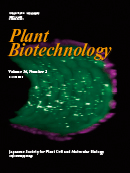
Plant Biotechnology
Scope & Guideline
Cultivating Insights for a Greener Future.
Introduction
Aims and Scopes
- Genetic Transformation Techniques:
The journal emphasizes innovative methods for genetic transformation in plants, including Agrobacterium-mediated transformation, biolistic methods, and CRISPR/Cas9 genome editing, showcasing advancements that enhance transformation efficiencies and target gene modifications. - Metabolic Engineering:
Research articles focus on the metabolic engineering of plants to improve specific traits, such as stress tolerance, nutritional content, and secondary metabolite production, thereby contributing to plant resilience and agricultural productivity. - Plant-Microbe Interactions:
Papers exploring the interactions between plants and microbial communities, including symbiotic relationships and pathogen responses, highlight the role of biotechnology in enhancing plant health and productivity. - Plant Developmental Biology:
The journal covers studies on the molecular mechanisms underlying plant development, including gene regulation during flowering, fruit development, and responses to environmental stimuli. - Functional Genomics and Transcriptomics:
Research incorporating transcriptomic analyses to understand gene function and regulation in various plant species is a key focus, providing insights into complex biological processes. - Sustainable Agricultural Practices:
The journal promotes research that aligns with sustainable agricultural practices, including the development of crops with improved resistance to biotic and abiotic stresses, which is crucial for food security in changing climates.
Trending and Emerging
- Genome Editing Technologies:
There is a significant increase in research focused on genome editing technologies, particularly CRISPR/Cas9, as scientists explore precise gene modifications and their applications in crop improvement. - Stress Tolerance Mechanisms:
An emerging theme is the investigation of genetic and metabolic pathways that confer stress tolerance in plants, especially under abiotic stresses such as drought, salinity, and heat, which are critical in the context of climate change. - Plant Secondary Metabolites:
Research on the biosynthesis and enhancement of plant secondary metabolites, particularly those with pharmaceutical and nutraceutical properties, is gaining attention, reflecting a broader interest in the economic and health benefits of plant-derived compounds. - Synthetic Biology Applications:
The application of synthetic biology techniques to engineer plants for specific traits, including novel pathways for metabolite production, is becoming increasingly prevalent, indicating a shift towards more complex biotechnological solutions. - Integration of Omics Technologies:
The integration of genomics, transcriptomics, proteomics, and metabolomics is emerging as a vital approach for comprehensive understanding of plant biology and biotechnology, facilitating the development of multi-faceted strategies for crop improvement.
Declining or Waning
- Traditional Breeding Techniques:
There is a noticeable decrease in papers focusing solely on traditional breeding methods, as the emphasis shifts toward molecular and biotechnological approaches that promise faster and more precise improvements. - Conventional Micropropagation Techniques:
Research on standard micropropagation techniques appears to be declining as newer, more efficient methods gain traction, such as those utilizing genetic transformation combined with tissue culture. - Basic Plant Physiology Studies:
There is a waning interest in basic plant physiology studies that do not incorporate biotechnological applications, as the journal increasingly prioritizes research that directly applies biotechnological advancements to practical problems.
Similar Journals

Frontiers in Plant Science
Unlocking the secrets of plant science for global impact.Frontiers in Plant Science is a premier open-access journal dedicated to advancing the understanding of plant biology, covering a broad spectrum of topics including physiology, ecology, and biotechnology. Published by FRONTIERS MEDIA SA in Switzerland, this journal has established itself as a key resource in the field of plant science, boasting an impressive impact factor and ranking in the Q1 category for plant science as of 2023. With its Scopus rank of 61 out of 516 in both Agricultural and Biological Sciences, the journal is recognized for its quality and relevance, being in the 88th percentile among its peers. Since its inception in 2010, Frontiers in Plant Science has embraced an open-access format, ensuring that cutting-edge research is readily available to scientists, professionals, and educators around the globe. The journal aims to foster innovative research and collaboration within the plant science community, making it an essential publication for those looking to stay at the forefront of the discipline.

aBIOTECH
Transforming ideas into groundbreaking solutions in life sciences.aBIOTECH, published by SPRINGERNATURE, is a premier academic journal dedicated to advancing the fields of biotechnology, agronomy, and molecular biology. With an impressive ISSN of 2096-6326 and E-ISSN 2662-1738, this journal has established itself as a vital resource for researchers and professionals aiming to publish high-quality, impactful studies. Based in Singapore, aBIOTECH has achieved remarkable recognition, boasting a Q1 ranking in multiple categories including Agronomy and Crop Science, Biochemistry, and Genetics in the 2023 Scopus rankings. Its solid position in the 90th percentile for Biochemistry and Genetics reinforces its significance within the global scientific community. The journal covers a broad spectrum of topics relevant to both basic and applied research, facilitating a shared dialogue amongst scientists and encouraging collaborative progress in innovative biotechnological applications. The open-access nature of the journal ensures that cutting-edge research is freely available, fostering a global exchange of ideas that is critical to the advancement of science today.
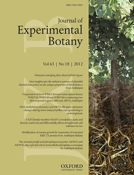
JOURNAL OF EXPERIMENTAL BOTANY
Exploring the intricate world of plant functions.JOURNAL OF EXPERIMENTAL BOTANY, published by Oxford University Press, stands as a premier journal for researchers and professionals in the fields of plant science and physiology. With an illustrious history dating back to 1950, this journal has established itself as a critical resource for advancing our understanding of plant biology and its applications. It is recognized in the top tier of academic publishing, reflected in its Q1 rankings in both Plant Science and Physiology for 2023, and boasts impressive Scopus rankings—placing it in the 96th and 91st percentiles of its respective categories. Though not an open-access journal, it ensures widespread access to groundbreaking research aimed at unraveling the complexities of plant functions and adaptations. As we look toward 2024, the JOURNAL OF EXPERIMENTAL BOTANY continues to play an essential role in fostering innovation, collaboration, and education within this vital area of science.

Plant Gene
Exploring the Genetic Blueprint of FloraPlant Gene is an esteemed academic journal dedicated to the comprehensive study of plant genetics, genomics, and biotechnology. Published by Elsevier, this journal operates from its base in the Netherlands and has made significant strides since its inception in 2015, with a converged year span extending until 2024. As an integral resource in the field, Plant Gene is categorized in the Q2 quartile for Plant Science and Q3 for Biochemistry, Biotechnology, and Genetics as per the 2023 evaluations, reflecting its growing influence and quality of research. With an impactful presence in Scopus rankings—positioned at #145 in Plant Science—this journal serves as a platform for presenting innovative findings and advancing knowledge in plant science. Researchers, professionals, and students will find access to cutting-edge research articles that not only drive the scientific community forward but also offer invaluable insights into the genetic mechanisms underpinning plant development and resilience. While the journal currently operates under a subscription-based model, it aims to broaden accessibility and foster a diverse range of scholarly discussions in the ever-evolving field of plant genetics.

Zemdirbyste-Agriculture
Empowering the agricultural community through open access insights.Zemdirbyste-Agriculture is a prominent journal dedicated to advancing the field of agricultural sciences, with a particular focus on agronomy and crop science. Published by the Lithuanian Research Centre Agriculture & Forestry, this open access journal has been fostering knowledge sharing and scientific discourse since 2004, allowing researchers, professionals, and students unrestricted access to its content. Located in the beautiful country of Lithuania, specifically at Vytautas Magnus University, this journal plays a significant role in disseminating innovative research findings. With a 2023 Scopus ranking of #246 out of 406 in the category of Agricultural and Biological Sciences, Zemdirbyste-Agriculture falls within the Q3 quartile, reflecting its growing influence in the academic community. This journal, which has converged its publication focus from 2008 to 2023, aims to provide a platform for scientists to share their critical insights on agricultural practices, sustainability, and technological advancements in crop science, thereby contributing to the global discourse on food security and environmental health.

Annual Review of Plant Biology
Unveiling the Secrets of Plant MechanismsThe Annual Review of Plant Biology, published by Annual Reviews, stands as a premier academic journal dedicated to the comprehensive coverage of significant developments in the field of plant biology. With an impactful presence in the United States and a stellar reputation reflected in its Q1 rankings across multiple categories including Cell Biology, Molecular Biology, Physiology, and Plant Science, this journal consistently ranks among the top within its domain. The journal is particularly esteemed for its synthesis of the latest research findings, making it an invaluable resource for researchers, professionals, and students seeking in-depth insights and advancements in plant biology. Though it does not offer open access, the Annual Review of Plant Biology is essential for those committed to exploring the intricate mechanisms underlying plant function and development, with coverage spanning from 1996 to 2024. As the field continues to evolve, this journal will undoubtedly remain at the forefront, driving innovation and fostering a deeper understanding of plant sciences.
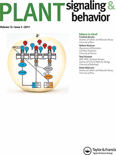
Plant Signaling & Behavior
Revolutionizing Understanding of Plant InteractionsPlant Signaling & Behavior is a prestigious journal published by TAYLOR & FRANCIS INC, dedicated to advancing the understanding of the complex signaling mechanisms and behavioral responses of plants. With an ISSN of 1559-2316 and an E-ISSN of 1559-2324, it has firmly established itself in the field of Plant Science, earning a Q1 ranking in the 2023 category quartiles and ranking #83 out of 516 in Agricultural and Biological Sciences, placing it in the 84th percentile according to Scopus metrics. The journal serves as a vital platform for researchers and professionals looking to publish innovative studies and reviews that explore the intricate relationships between plant behavior and environmental signaling. With coverage spanning from 2006 to 2024, Plant Signaling & Behavior not only enhances academic discourse but also supports the growing interdisciplinary nature of plant sciences. Although the journal is not open access, it remains a significant resource for students, researchers, and practitioners aiming to deepen their understanding of plant signaling and its implications for ecology and agricultural practices.

PHYSIOLOGY AND MOLECULAR BIOLOGY OF PLANTS
Innovating Agriculture through Plant Molecular InsightsPHYSIOLOGY AND MOLECULAR BIOLOGY OF PLANTS, published by SPRINGER, is a vital journal focused on the advancing field of plant science. Featuring research that spans physiology, molecular biology, and their applications in agriculture, this journal is pivotal for academics, professionals, and students keen on understanding plant processes and enhancing crop production. With an ISSN of 0971-5894 and an E-ISSN of 0974-0430, this journal is recognized for its scholarly significance, ranking in the Q3 category in Molecular Biology, Q2 in Physiology, and Q1 in Plant Science as of 2023. The journal maintains a strong position in the Scopus rankings, with notable percentile rankings including 87th in Plant Science. Established in 2000, this publication aims to foster the dissemination of cutting-edge research by providing a platform for open discussion and knowledge sharing about plant physiology and molecular mechanisms. While it does not currently offer open access options, its comprehensive studies and reviews serve as an essential resource for enhancing our understanding of plant biology.
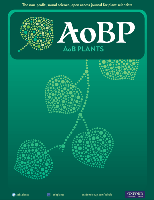
AoB Plants
Exploring the vital roles of plants in our world.AoB Plants is a distinguished open-access journal published by Oxford University Press, dedicated to advancing the field of plant science. Since its inception in 2009, this journal has played a pivotal role in disseminating high-quality research that encompasses a wide range of topics including plant biology, ecology, and biotechnology. With an impressive impact factor and a ranking in the Q1 quartile for Plant Science, AoB Plants is recognized for its innovative contributions and scholarly rigor, ranking #129 out of 516 in the Scopus Agricultural and Biological Sciences category, placing it in the 75th percentile among its peers. By promoting open-access availability of research findings, the journal empowers researchers and practitioners alike, facilitating greater collaboration and knowledge sharing in the global scientific community. Situated in the heart of the United Kingdom, AoB Plants continues its commitment to providing a platform for pioneering research and developments in plant science, thus fostering a deeper understanding of the crucial roles that plants play in our ecosystems and economies.
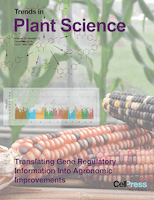
TRENDS IN PLANT SCIENCE
Leading the Way in Plant Science InnovationTRENDS IN PLANT SCIENCE is a premier academic journal published by CELL PRESS, dedicated to advancing the field of plant sciences. With an ISSN of 1360-1385 and E-ISSN 1878-4372, this journal has established itself as a critical resource for researchers and practitioners alike, boasting a remarkable impact factor that places it in the Q1 quartile for plant science in the 2023 rankings. Featuring a comprehensive scope that encompasses emerging trends, innovative research, and pivotal reviews in the plant sciences, it aims to promote interdisciplinary dialogue and encourage progressive research methodologies. Hailing from the United Kingdom, TRENDS IN PLANT SCIENCE serves a global community of over 516 journals, achieving a top-tier ranking of 3rd in the Scopus ranking for Agricultural and Biological Sciences. This makes the journal an indispensable asset for anyone aiming to keep abreast of the latest developments in plant biology and its applications. As we look towards its future converging years from 1996 to 2024, the journal continues to foster scholarly excellence and innovation in the field.